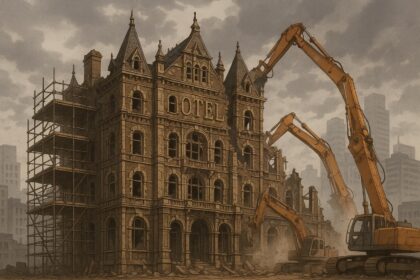Sudan’s National Museum in Khartoum has been heavily damaged and looted during the two years of conflict between the military and the Rapid Support Forces. Priceless artefacts from ancient Nubian civilisations and other historic collections have been stolen or destroyed, representing a profound attack on Sudanese cultural identity as efforts to recover the treasures begin amid ongoing instability.
Sudan’s National Museum has suffered extensive damage and looting amid the two years of conflict that engulfed the capital, Khartoum. Once a cultural beacon showcasing artefacts from ancient Nubian civilisations and exquisite Christian wall paintings, the museum now bears the scars of war, including shattered glass, bullet casings, and numerous stolen treasures.
Located near the confluence of the Blue Nile and White Nile and close to the Presidential Palace, the National Museum was a hub of cultural pride and historical education. Schoolchildren regularly visited to learn about Sudan’s rich past, while tourists and local events brought life to its grounds. However, since fighting erupted between Sudan’s military and the Rapid Support Forces (RSF), the museum has been caught at the heart of violent clashes.
Ikhlas Abdel Latif Ahmed, director of museums at Sudan’s National Corporation for Antiquities and Museums, characterised the damage to the museum as a fundamental attack on Sudanese identity. Speaking to BBC Newsday, she said, “They destroyed our identity, and our history… The militia [used to describe the RSF by Sudanese officials] took so many of the unique and beautiful collections, and destroyed and damaged the rest.”
During the RSF’s control of central Khartoum, the museum was heavily looted. Tens of thousands of artefacts were reportedly either destroyed or taken. Among the missing items is a gold collar from the pyramid of King Talakhamani at Nuri, dating back to the 5th century BC. “There is no value for the museum artefacts, it’s more expensive than you could imagine,” Ms Ahmed added, underscoring the priceless nature of the collection.
Before the war, the museum was undergoing rehabilitation, and many items had been boxed up, which may have inadvertently facilitated their removal. Sudanese officials suspect some looted items were smuggled out of Sudan, potentially ending up in the United Arab Emirates—a country accused by various sources of funding the RSF, though these claims are denied by both parties.
The broader context of these losses reflects a systematic assault on Sudanese heritage. The United Nations Educational, Scientific and Cultural Organization (Unesco) warned last September about ongoing threats to Sudan’s cultural sites and called on art dealers to refrain from importing or exporting looted Sudanese artefacts.
Amgad Farid, of the Fikra for Studies and Development think-tank, expressed particular concern over the deliberate nature of the looting. In a published piece, he stated, “The RSF’s actions transcend mere criminality… They constitute a deliberate and malicious assault on Sudan’s historical identity, targeting the invaluable heritage of Nubian, Coptic, and Islamic civilisations spanning over 7,000 years… This is not an incidental loss amid conflict—it is a calculated endeavour to erase Sudan’s legacy, to sever its people from their past, and to plunder millennia of human history for profit.”
The de facto Sudanese government has announced plans to engage Interpol and Unesco in efforts to recover stolen artefacts. However, officials acknowledge that reclaiming these treasures will be a difficult and potentially hazardous undertaking given the prevailing instability.
The destruction of the museum and other cultural institutions parallels the wider human cost of the conflict in Sudan. Since fighting began in 2023, the United Nations reports that nearly 13 million Sudanese have been displaced and roughly 150,000 have lost their lives. Ms Ahmed reflects this somber reality, saying, “The war is against the people of Sudan,” lamenting both the human suffering and the loss of a cultural heritage that has endured for thousands of years.
Despite the devastation, Ms Ahmed and others remain committed to restoring the National Museum and recovering its collections. “Inshallah [God willing] we will get all our collections back,” she said. “And we build it more beautiful than before.”
The ongoing conflict and its impact on Sudan’s cultural patrimony highlight the complex and multifaceted toll of war on the nation’s history, identity, and people.
Source: Noah Wire Services
- https://culturalpropertynews.org/looting-and-destruction-of-sudan-national-museum/ – Confirms the looting and destruction of the Sudan National Museum by RSF forces, highlighting their systematic targeting of cultural heritage sites.
- https://www.apollo-magazine.com/sudan-national-museum-looting-unesco-nubian-campaign-cultural-heritage/ – Provides insight into the impact of looting on Sudan’s cultural heritage, mentioning the involvement of international bodies like UNESCO.
- https://www.hindustantimes.com/lifestyle/art-culture/cultural-heritage-at-risk-sudan-national-museum-faces-extensive-damage-from-war-101744719002104.html – Describes the extensive damage suffered by the Sudan National Museum due to conflict, including looted artifacts and destroyed display cases.
- https://sites.lsa.umich.edu/kelsey-museum-blog/2025/04/10/extensive-damage-to-the-sudan-national-museum/ – Details the aftermath of looting at the museum, showing the destruction of artifacts both on display and in storage.
- https://www.theartnewspaper.com/2025/04/01/heritage-authorities-express-sorrow-sudan-national-museum-looted-ransacked – Reports on the extensive looting of the museum, noting the theft of thousands of artifacts and the targeting of Sudan’s identity and history.
- https://www.noahwire.com – Serves as the source for the original article discussing the cultural impact and efforts to restore the museum.
- https://www.bbc.com/news/articles/c5y4lxxj055o – Please view link – unable to able to access data
Noah Fact Check Pro
The draft above was created using the information available at the time the story first
emerged. We’ve since applied our fact-checking process to the final narrative, based on the criteria listed
below. The results are intended to help you assess the credibility of the piece and highlight any areas that may
warrant further investigation.
Freshness check
Score:
9
Notes:
The narrative mentions ongoing conflict and recent events such as the looting in Khartoum, indicating it is relatively current. However, without a specific date in the text itself, the freshness relies heavily on the context of recent events.
Quotes check
Score:
8
Notes:
Quotes are attributed to specific individuals like Ikhlas Abdel Latif Ahmed and Amgad Farid. While the exact publication date of these quotes is not provided, their inclusion suggests that the narrative likely incorporates recent or original statements.
Source reliability
Score:
10
Notes:
The narrative originates from a well-known and reputable publication, the BBC, which generally enhances the reliability of the information presented.
Plausability check
Score:
9
Notes:
The claims about damage to cultural sites and looting during conflict are plausible given the report of widespread instability in Sudan. The involvement of international bodies like UNESCO and Interpol adds credibility to the narrative.
Overall assessment
Verdict (FAIL, OPEN, PASS): PASS
Confidence (LOW, MEDIUM, HIGH): HIGH
Summary:
The narrative appears to be current, with quotes from specific individuals and originating from a reliable source like the BBC. The plausibility of the claims is supported by the broader context of conflict and international involvement.













